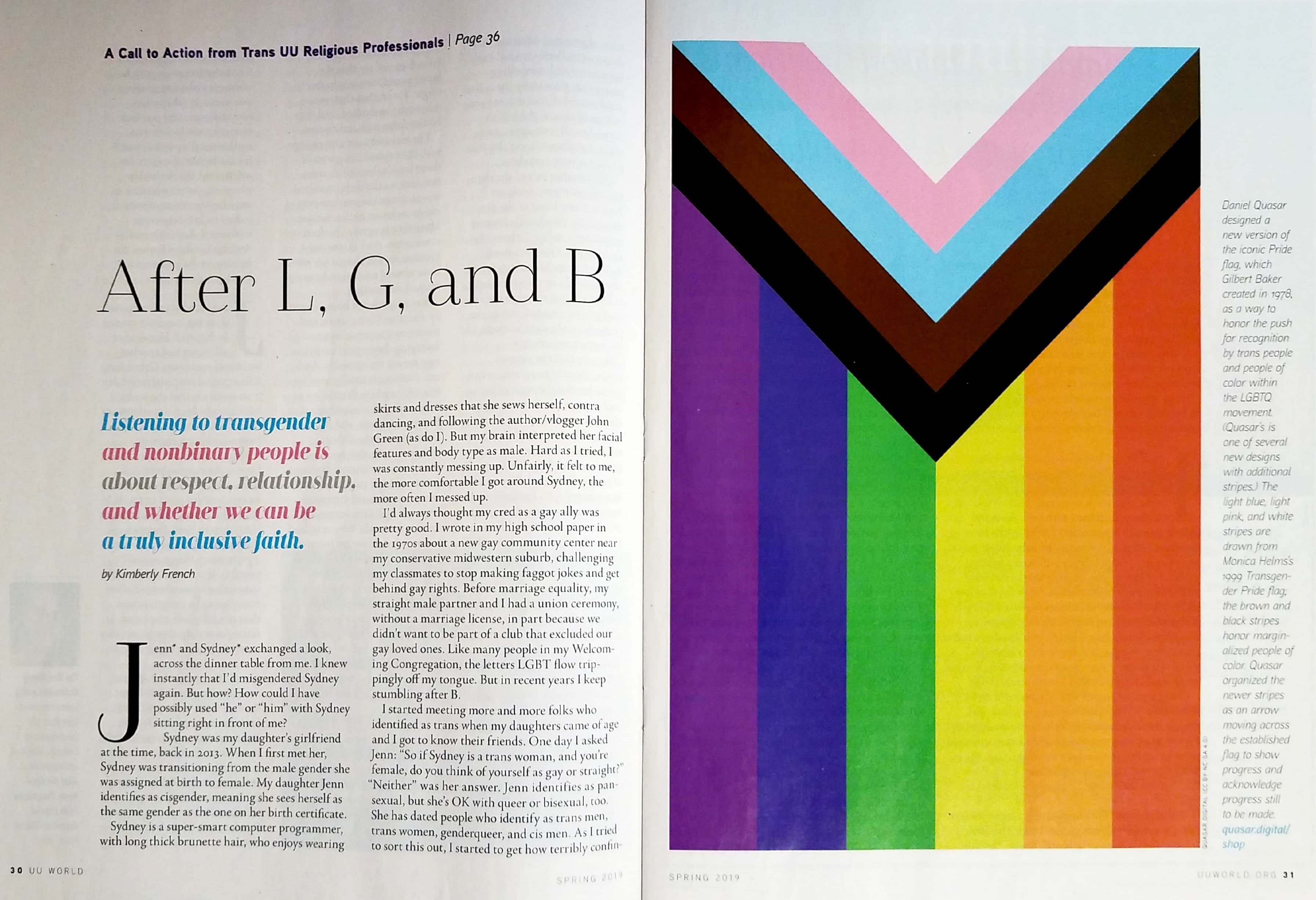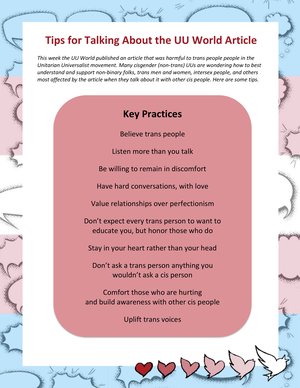- Happy Activism: A Sustainable Way to Create Change Without Burnout - February 9, 2026
- The Meaning of Critical Thinking: A Key Skill for Navigating Today’s Information Landscape - November 3, 2025
- Grandparents Can Develop Activist Grandchildren - September 29, 2025
Last Updated on October 23, 2024
Listen to trans people when they speak their truth. Centering trans narratives and supporting trans voices is critical, although UU World magazine missed an opportunity.
Centering Trans Narratives
Scrolling through my Facebook feed, I realized that my Unitarian Universalist friends were up in arms about something related to the most recent edition of UU World magazine. UUs are liberal congregations, welcoming to all, no exception, and wholly committed to social justice. It was no surprise to me that my UU friends were up in arms about something; that happens regularly. But this was concern about the UUA, the central organization. Unfortunately, although centering trans narratives and supporting trans voices is critical, they published an article about trans people written by a cisgender woman. (The term cisgender means the person’s identity corresponds with the sex they were assigned at birth.)

Reader were outraged that the article, “After L, B, and G: Listening to transgender and nonbinary people is about respect, relationship, and whether we can be truly inclusive faith,” didn’t center trans narratives.
Ultimately the magazine editor issued an apology:
Our story hurt people. Acknowledging that we have fallen short, UU World is committed to sharing in appropriate and respectful ways the inspiring and powerful stories of trans and gender nonbinary people within our faith community.
Supporting Trans Voices
Nothing About Us Without Us Is for Us. –Hazel Edwards

If youth, and specifically trans youth, are not given seats at the table to be able to bring their perspectives and their experiences and the ways that they could be best supported, then the policy or the legislation or whatever the rule is will not adequately support [them]. Hazel Edwards
For example, cisgender people should not create policy for transgender people. Instead, the creation of the policy should center their voices. Cisgender people have the privilege of being heard and accepted, but that does not mean we know what is best for marginalized communities.
In another instance, Edwards reviewed a school policy that required transgender students to be ‘consistently and persistently’ living their gender identity. However, that policy gave no consideration to the students’ privacy, comfort, and safety. Edwards was able to provide feedback on the document, thus centering the trans narrative.
Allys Should Center Trans Narratives
In response to the UU World article, Transforming Hearts Collective published a guide for talking about the UU World article.

The key practices they recommend are:
- Believe trans people
- Listen more than you talk
- Be willing to remain in discomfort
- Have hard conversations, with love
- Value relationships over perfectionism
- Don’t expect every trans person to want to educate you, but honor those who do
- Stay in your heart rather than your head
- Don’t ask a trans person anything you wouldn’t ask a cis person
- Comfort those who are hurting and build awareness with other cis people
- Uplift trans voices
Those of us who hold privilege in the world, such as being cisgender, sometimes get exasperated when marginalized people complain about poor treatment. I believe the UU World reporter wanted to encourage a “truly inclusive faith.” But if I had read the piece without being alerted to the issues, my privilege might have stopped me from seeing that supporting trans voices is critical.
Learn more about how to be a good ally for the LGBTQ+ community.
Privilege and Fragility
I recently read the book White Fragility Why It’s So Hard For White People To Talk About Racism. Author Robin DiAngelo writes about the white supremacy culture that we must dismantle, and one part of that is to center the voices of people of color. However, our white fragility manifests itself in many ways.
Fragility is a state in which even a minimum amount of racial stress becomes intolerable, triggering a range of defensive moves. These moves include the outward display of emotions such as anger, fear, and guilt, and behaviors such as argumentation, silence, and leaving the stress-inducing situation. These behaviors, in turn, function to reinstate white racial equilibrium. – Robin DiAngelo
DiAngelo talks about good intentions, and why they are harmful. She suggests we focus on impact and forget intentions.
So, when the first key principle is ‘believe trans people,” what I think isn’t the issue. Trans people, who have lived with discrimination and little opportunity to be heard, hold the truth. Be quiet, let them speak their truth, and believe them.
READ NEXT
It’s Pronounced Metrosexual An online resource for social justice, gender, and sexuality
What White People can do to Support Racial Justice This post focuses on racial equality but the information on evaluating your privilege can be used for any cause.
Writing is powerful. Browse more examples of artistic activism.
Did Harper Lee Need a Sensitivity Reader?
Teach Your Child to Be an Activist
It’s Time for You To Make the World a Better Place
At the Intersection of Mentoring and Activism
At the Intersection of Ego and Creativity




Pingback: Did Harper Lee Need a Sensitivity Reader? • Life At the Intersection
Pingback: Why are Sensitivity Readers So Controversial?
Pingback: How to Use Artistic Activism to Change the World
Thanks for sharing with us at The Blogger’s Pit Stop!
Thank you for stopping by!